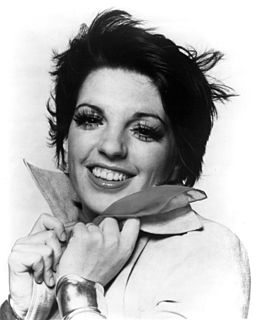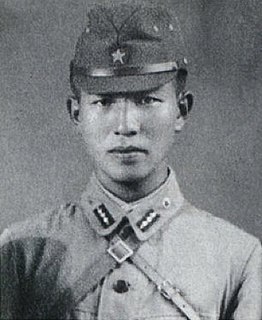A Quote by Samuel Beckett
How do you manage it, she said, at your age? I told her I'd been saving up for her all my life.
Related Quotes
She didn’t understand why it was happening,” he said. “I had to tell her she would die. Her social worker said I had to tell her. I had to tell her she would die, so I told her she was going to heaven. She asked if I would be there, and I said that I would not, not yet. But eventually, she said, and I promised that yes, of course, very soon. And I told her that in the meantime we had great family up there that would take care of her. And she asked me when I would be there, and I told her soon. Twenty-two years ago.
In People magazine, Madonna said her life has been exhausting since she started her world tour. She said there isn't a second of her life that isn't taken up looking after her family or thinking of her show - her day is filled with problems of work and family. Someone should tell her, everyone else calls that, life.
I've been afraid of being Cansrel,' she said aloud to her reflection. 'But I'm not Cansrel.' At her elbow, Musa said blandly, 'Any one of us could have told you that, Lady.' Fire looked at the captain of her guard and laughed, because she wasn't Cansrel- she wasn't anyone but herself. She had no one's path to follow; her path was her own to choose.
Dr. Armonson stitched up her wrist wounds. Withen 5 minutes of the transfusion he declared her out of danger. Chucking her under the chin, he said, "What are you doing here, honey? Your not even old enough to know how bad life gets." And it was then Cecelia gave orally what was to be her only form of suicide note, and a useless one at that, because she was going to live: "Obviously, Doctor," she said, "you've never been a 13 year old girl.
My mother’s been living alone for over ten years. She gets up at six every morning. She makes herself a coffee. She waters her plants. She listens to the news on the radio. She drinks her coffee. She has a quick wash. An hour later, at seven, her day is over. Two months ago a neighbour told her about your blog, and she asked me to buy her one of those thingummyjigs – by a thingummyjig she meant a computer. And since then, thanks to your trimmings, your ribbon bows, your tie-backs for curtains, she’s rediscovered the joys of life. So don’t tell me you don’t know any answers.
Her little shoulders drove me mad; I hugged her and hugged her. And she loved it. 'I love love,' she said, closing her eyes. I promised her beautiful love. I gloated over her. Our stories were told; we subsided into silence and sweet anticipatory thoughts. It was as simple as that. You could have all your Peaches and Bettys and Marylous and Ritas and Camilles and Inezes in this world; this was my girl and my kind of girlsoul, and I told her that.
She asked me what was wrong, and I told her I had to end it. She was surprised, and asked my why I thought so. I told her it wasn't a thought, more a feeling, like I couldn't breathe and knew I had to get some air. It was a survival instinct, I told her. She said it was time for dinner. Then she sat me down and told me not to worry. She said moments like this were like waking up in the middle of the night: You're scared, your'e disoriented, and you're completely convinced you're right. But then you stay awake a little longer and you realize things aren't as fearful as they seem.
She realized how many of her beliefs were either unrealistic or belonged to her deceased parents and her ex-husband. She also realized that her expectations for herself and others were sometimes too rigid. She was trying to live up to what everyone else said was best for her, which made her depressed and hard to be around at times. Once she changed her beliefs about herself and others, she began to smile more and enjoy life.
(on Marilyn Monroe) I was walking down Broadway with her and nobody was stopping us. She was going to (Stella Adler's) actors' studio, and she was taking me to show me what it was all about. And I said to her: "How come nobody is taking your picture?" She said: "Well, watch." She took her scarf off, straightened her shoulders, and draped something another way, and we were surrounded. It must have been 400 people. And I said: "Now I know why!"
She wasn't ready to settle down, she told her friends. That was one way of putting it. Another was would have been that she had not found anyone to settle down with. There had been several men in her life, but they hadn't been convincing. They'd been somewhat like her table - quickly acquired, brightened up a little, but temporary. The time for that kind of thing was running out, however. She was tired of renting.
What's weird is when you meet a girl who is 23 and you are talking to her, even her voice is high-pitched, she's young. You ask her how old she is, she says, 'Twenty-three, how old are you?' and when I tell her I'm 41 it's like I've just told her I have cancer. It's, 'Oh my God, how long have you had that?'
The world taught women nothing skillful and then said her work was valueless. It permitted her no opinions and said she did not know how to think. It forbade her to speak in public and said the sex had no orators. It denied her the schools, and said the sex had no genius. It robbed her of every vestige of responsibility, and then called her weak. It taught her that every pleasure must come as a favor from men and when, to gain it, she decked herself in paint and fine feathers, as she had been taught to do, it called her vain.
From an early age she had developed the art of being alone and generally preferred her own company to anyone else’s. She read books at enormous speed and judged them entirely on her ability to remove her from her material surroundings. In almost all the unhappiest days of her life she had been able to escape from her own inner world by living temporarily in someone else’s, and on the two or three occasions that she had been too upset to concentrate she had been desolate.





































